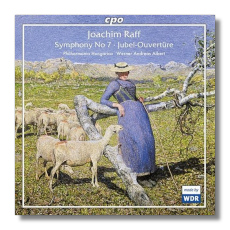
The Internet's Premier Classical Music Source
Related Links
- Raff Reviews
- Latest Reviews
- More Reviews
-
By Composer
-
Collections
DVD & Blu-ray
Books
Concert Reviews
Articles/Interviews
Software
Audio
Search Amazon
Recommended Links
Site News
 CD Review
CD Review
Joachim Raff

- Symphony #7 in B Flat Major, Op. 201 "In the Alps"
- Jubilee Overture, Op. 103
Philharmonia Hungarica/Werner Andreas Albert
CPO 999289-2 DDD 65:38
For many years, the only symphony by Joachim Raff that was heard with any regularity was the Fifth, or "Lenore" Symphony. He wrote eleven of them, though, and lately conductors and record companies have been exploring them in search of forgotten Romantic treats.
Raff was born in Switzerland, but he spent most of his adult life in Germany. To my ears, the composer whose music most resembles Raff's is Robert Schumann (twelve years Raff's senior), although Raff lacked Schumann's genius and innovative gifts. He did not forget his Swiss homeland, and it is likely that it was Switzerland that Raff had in mind when he wrote "In the Alps" in 1875. The finale is titled "Beim Schwingfest," "Schwingfest" being the Swiss variation on wrestling. The first three movements are "Wanderung im Hochgebirge" (Hiking in the High Peaks), "In der Herberge" (In the Inn), and "Am See" (By the Lake). Topically, the first movement, at least, anticipates Richard Strauss's Eine Alpensinfonie, although Strauss's symphony is a great deal more advanced. Raff was not a composer who rocked the boat. At the same time, he was very good at what he did – he may have been a good academic, but he was not dull. Orchestration was one of his strengths. In fact, he asserted that he orchestrated Liszt's piano concertos and several of the symphonic poems too, although those claims have not been independently confirmed.
The Jubilee Overture – almost 16 minutes long – is not a slight curtain-raiser. Raff wrote it in 1864 to celebrate the twenty-fifth year of "His Majesty and Most Serene Highness, Prince and Lord Adolf, Duke of Nassau" on the throne. It is confusing that the British sing "God Save the Queen" to the same tune as Americans use for "America" ("My country, 'tis of thee," etc.), but apparently other nations liked the tune too, because it is "God Save the Queen" (or whomever) that is used for the good old Duke of Nassau as well. Raff quotes the tune with appropriate gravitas at the beginning, and brings it back towards the end for fugal treatment, with a grand finale.
Earlier releases with Albert and the Philharmonia Hungarica have done Raff justice, and this one, recorded in 1991 and 1992, is on the same high level. Unfortunately, this orchestra, originally comprised of Hungarian expatriates living in Switzerland, no longer exists, killed off by a lack of funding. Ironically, in the booklet, CPO has reprinted (in extremely tiny print) a 1977 letter from Yehudi Menuhin congratulating the orchestra on its success as a "most successful example of a cultural transplant."
The annotations by Matthias Wiegandt are exceptionally complete. Bravo. This is a fine way to learn more about Raff.
Copyright © 2004, Raymond Tuttle



















